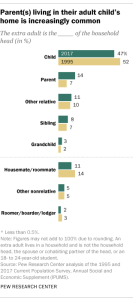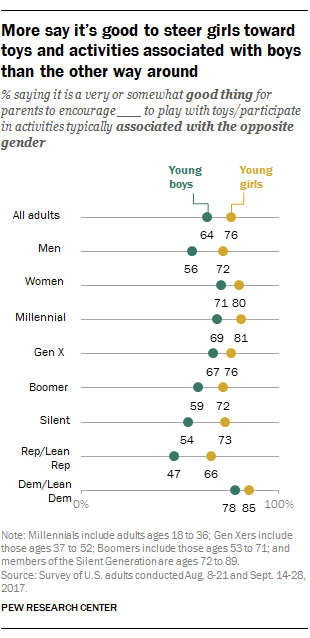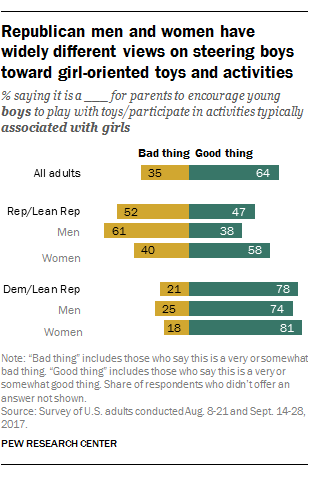
Parents navigating the toy aisle this holiday season may notice that some retailers and manufacturers have moved away from marketing toys specifically toward boys or girls. While this recent trend has drawn some criticism, most Americans say it’s good for parents of young boys and girls to encourage their children to play with toys and participate in activities that are typically associated with the opposite gender.

About three-quarters of the public (76%) says it is a somewhat or very good thing for parents to steer girls toward boy-oriented toys and activities, according to a Pew Research Center survey conducted in August and September. A smaller share, but still a majority (64%), says parents should encourage boys to play with toys and participate in activities usually associated with girls. Across genders, generations and political groups, more say girls should be encouraged to play with toys and participate in activities that break with gender norms than say the same about boys, and this is particularly the case among men, older adults and Republicans.
Solid majorities of women say it’s a good thing for parents to encourage girls (80%) and boys (71%) to play with toys or participate in activities that are typically associated with the other gender. Among men, however, there is a 16-percentage-point gap between those who say this is a good thing when raising girls (72%) and those who say the same about raising boys (56%).
When it comes to raising girls, Millennials are somewhat more likely than Gen Xers, Baby Boomers and those in the Silent Generation to say parents should encourage their daughters to play with toys and participate in activities that are typically associated with boys. But majorities of seven-in-ten or more across all four groups see this as a good thing. Smaller shares across generations see value in encouraging boys to play with toys and participate in activities that are typically associated with girls, although Millennials (69%) and Gen Xers (67%) are more likely than those in the Baby Boom (59%) and Silent (54%) generations to see this as a good thing.
Democrats and Republicans are more likely to say it’s good for girls than to say it’s good for boys to be encouraged to play with toys or participate in activities typically associated with the opposite gender. But Republicans and Republican-leaning independents make more of a distinction between what’s good for girls compared with boys. While 66% of Republicans say it’s a good thing to encourage girls to engage in boy-oriented activities, only 47% say it’s good to take a gender-neutral approach with boys. About half (52%) of Republicans say it’s a very or somewhat bad thing for parents to steer young boys toward toys and activities typically associated with girls.

Republican men are particularly resistant to the idea of boys playing with toys and participating in activities that are typically associated with girls. About six-in-ten Republican men (61%) say it’s a bad thing for parents to encourage young boys to do this, while just 38% say this is a good thing. In contrast, a majority of Republican women (58%) see this as a good approach for raising boys.
Among Democrats and those who lean Democratic, 85% say it’s a good thing for parents to encourage young girls to play with toys or take part in activities that are normally associated with boys, and 78% say it’s good to encourage young boys to engage in girl-oriented activities.
